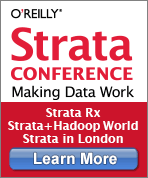Intel’s taking the lead in the new “data economy”
Intel is looking to take the lead in what it has dubbed the “data economy,” helping consumers and individuals realize and retain more value from their personal data. Antonio Regalado and Jessica Leber report at MIT Technology Review that the the world’s largest computer chip maker has launched a “Data Economy Initiative.” Ken Anderson, a cultural anthropologist who is in charge of the project, described the initiative to them as “a multiyear study whose goal is to explore new uses of technology that might let people benefit more directly, and in new ways, from their own data.”
As part of the initiative, Intel is funding hackathons to encourage developers to experiment with personal data in new ways, Regalado and Leber note. “[Intel] has also paid for a rebellious-sounding website called We the Data,” they report, “featuring raised fists and stories comparing Facebook to Exxon Mobil.” You can read their full report, including a close look at the ecosystem that may be giving rise to a new “data economy” at MIT Technology Review.
In related news, Christopher Mims reports at Quartz that results from Safe Shepherd’s millions of searches have shown that on average, each American has 12.5 personal records freely available and accessible online. Safe Shepherd is a company that searches public records on behalf of its users and clients and displays them in a dashboard.
Anyone can use their service for free to see what records are out there — Mims reports that a Safe Shepherd search showed 29 records that included his data on people-search sites alone; my own search showed 63, though some of those records weren’t mine. Users can then buy a membership for $13.95 per month to have the records expunged, according to the Safe Shepherd site. Mims notes, however, that Safe Shepherd can’t help with such problems as identity theft. You can read his full report at Quartz.
Sears extends its data reach into data centers
Rich Miller reports at Data Center Knowledge this week that Sears is getting into the data center business. The company has created Ubiquity Critical Environments, a new unit of Sears Holdings that will be responsible for identifying and repositioning appropriate store locations to be converted into data centers. Miller notes that “Sears Holdings has one of the largest real estate portfolios in the country, with 3,200 properties spanning 25 million square feet of space.”
Miller reports that Ubiquity will be able to choose from properties of both closed and open stores, and that the first conversion project will be a Sears store on the south side of Chicago that is slated to close in June. There’s the question of Sears’ mall properties as well. Ubiquity’s chief operating officer Sean Farney told Miller that though a mall location isn’t ideal for a data center at this point, he does see potential for disaster recovery space and convenient locations for wireless towers. Sears’ foray into data centers isn’t as much of a stretch as it might seem — the retail giant recently made a name for itself in Hadoop with the launch of its MetaScale data-management system.
Revolutionizing data publishing with open source tools
James Smith, a web developer at the Open Data Institute (ODI), presents an argument this week that open source tools could revolutionize open data publishing, much like they did with open source software. “Data is different from code in many ways, but the open source development model has a lot we can learn from,” Smith writes. “When I can fork your open dataset, fix errors, and easily get my changes integrated back in, we all win.”
Smith is fully committed to experimenting with the possibilities. He’s built a Git Data Viewer to help make Git repositories more user-friendly, and he’s uploaded a MOD dataset to GitHub for developers to tinker, where users can view an open pull request to improve a dataset file format. “I’m already learning that while many operations on datasets match well with Git,” he writes, “some do not.” He stresses that this is an experiment that might not work, but invites developers to join in.
Tip us off
News tips and suggestions are always welcome, so please send them along.
Related:
- Dueling views on data center efficiency
- Data centers running at the speed of light
- Curiosity turned loose on GitHub data
- A step toward personal data control
- More Strata Week coverage
 O’Reilly Strata Conference — Strata brings together the leading minds in data science and big data — decision makers and practitioners driving the future of their businesses and technologies. Get the skills, tools, and strategies you need to make data work.
O’Reilly Strata Conference — Strata brings together the leading minds in data science and big data — decision makers and practitioners driving the future of their businesses and technologies. Get the skills, tools, and strategies you need to make data work.
Strata Rx Health Data Conference: September 25-27 | Boston, MA
Strata + Hadoop World: October 28-30 | New York, NY
Strata in London: November 15-17 | London, England
